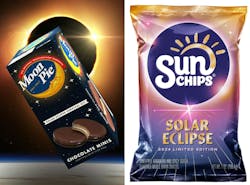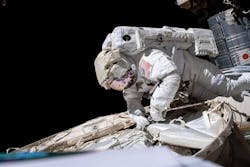So That Happened: Eclipse Food Fight and Lordstown Motors Returns (Sort of)
Editor’s note: Welcome to So That Happened, our editors’ takes on things going on in the manufacturing world that deserve some extra attention. This will appear regularly in the Member’s Only section of the site.
Ingersoll Rand’s Latest (And Biggest) Deal is For Bags, Tubes and … Spacesuits
Diversified manufacturer Ingersoll Rand Inc. has announced its largest-ever acquisition, one that executives say will grow their total addressable market by a whopping $10 billion—and make it the owner of the company that has supplied NASA its spacesuits since the beginning of the Apollo program.
Ingersoll Rand is preparing to pay private equity firm New Mountain Capital more than $2.3 billion in cash for ILC Dover, which employs more than 2,000 people globally and specializes in containment bags, tubes and other components used by pharmaceutical and medical device companies to keep their processes pure. Three-quarters of ILC Dover’s roughly $400 million in annual sales come from life sciences customers. The remainder comes from an engineering and space group that, in addition to spacesuits, makes spacecraft landing systems. blimps and more.
“The ILC Dover team sells to these production teams in factories. We like that because not only do we see that growth in life sciences […] but they can give great access to compression technologies and the compressor room,” Reynal told analysts on a March 25 call. “It has multiple vectors.”
Reynal and his team have in recent months teased larger acquisitions as they continue to build out Ingersoll Rand’s product assortment. (Last year, they spent almost $1 billion on more than a dozen purchases.) This week, they said the company has dozens more deals in the pipeline but emphasized that those that materialize will be of the more typical bolt-on variety.
—Geert De Lombaerde
Reshoring Report
If you consider yourself to be a dedicated IndustryWeek reader, you may remember our story Driving Innovation Through Autism Awareness in Recruiting, which profiled Peter Mann, founder and CEO of motor technology company Oransi.
At the time of this story’s publication, Oransi had purchased a facility in the U.S. and was working to reshore its manufacturing. Known for its air purifiers, Oransi wanted to bring jobs to the U.S. without dramatic price increases for the consumer. The company has recently achieved this goal, reshoring all its manufacturing in China to its Radford, Virginia, factory.
As a fun and entertaining way to spread the word, the company has recently released an upbeat video titled How One Business Brought Manufacturing Back to the US to introduce viewers to Oransi’s reshoring story. Give the video a watch to hear from Mann and other Oransi team members. Fair warning, you’ll most likely let out a chuckle or two.
—Anna Smith
Lordstown Motors Emerges ANu…Ride
Last summer, EV start up Lordstown Motors filed for Chapter 11 bankruptcy after it a potential financial lifeline from Taiwanese manufacturer Foxconn fizzled out. In recent weeks, though, it has been reborn as Nu Ride, a company whose primary purpose is to settle its litigation with Foxconn.
In case you missed it: Foxconn purchased Lordstown’s Ohio plant to build EVs and later promised a $170 million investment, but backed out when Lordstown faced delisting, essentially dooming the company. In May 2023, Lordstown sued Foxconn, claiming it had made the deal in bad faith to force bankruptcy, which Lordstown filed for in June. In September, the bulk of its assets were bought by its former CEO Steve Burns for his new start up LandX.
In present day, Nu Ride has roughly $78 million in cash, $1 billion in NOL carry forwards, and a new executive board. As for what’s next? It’s still anybody’s guess; Nu Ride’s filing stated that it may pursue future business opportunities. Until then, though, you’ll find it on the OTC Pink Market under the ticker NRDE.
—Jennifer Ramsay
Timken Announces New CEO
Come September 5, the Timken Co. will have a new CEO. He is Tarak Mehta, who will also take on the role of Timken president, the North Canton, Ohio-based manufacturer of engineered bearings and industrial motion products announced this morning. Timken CEO and President Richard G. Kyle will remain in his role until Mehta’s appointment date, at which time he will move into an advisory position and remain on the Timken board of directors.
Mehta currently is president of the motion business at ABB Ltd., where he is also a member of the group executive committee. His 35 years of industry experience include 26 years with ABB, where he has held various leadership positions.
“Bringing on a seasoned industry executive like Tarak as CEO underscores the board’s commitment to advancing Timken’s industrial diversification strategy,” said Timken Chairman John Timken Jr., in the announcement. “He is exceptionally qualified to lead Timken through our next chapter of growth and has a proven track record of developing global teams and operational excellence.”
Kyle, who joined Timken in 2006, has been president and CEO since the company completed its spinoff of TimkenSteel Corp. in 2014. Earlier this month, Timken released its 2023 annual report, where it reported record revenue of $4.8 billion.
—Jill Jusko
Hydrogen: Coming to a Steel Plant Near You?
Steel manufacturer Cleveland-Cliffs was a big winner in the new Industrial Demonstrations Program grants from the U.S. Department of Energy. The steelmaker will receive up to $500 million in federal funds to build a flex-fuel iron production plant in Middletown, Ohio, that will use hydrogen (and natural gas, when hydrogen is not available) instead of coal as the catalyst for iron oxide reduction.
When complete in 2029 (projected date), it would be the first hydrogen-fueled steel plant by a U.S.-headquartered steel manufacturer Similar plants are already in operation in Europe. Swedish steelmaker SSAB received a $500 million DOE grant for a hydrogen-fueled steel plant in Perry County, Mississippi.
The DOE grants are funded by the federal Inflation Reduction Act and the Bipartisan Infrastructure Law. Cleveland-Cliffs expects to contribute $1.3 billion to the project over five years.
In 2023, Cleveland-Cliffs completed a successful hydrogen injection pilot project at Middletown Works blast furnace. It’s working on a similar initiative at its Burns Harbor (Indiana) and Indiana Harbor plants, massive steel production facilities that it scooped up in the Arcelor-Mittal sale. Cleveland-Cliffs spent $10 million to build a hydrogen pipeline to feed the Indiana plants.
According to a 2020 European Parliament report, hydrogen steel was about a third more expensive than coal steel to produce, but the gap was narrowing. Full decarbonization of the steel industry would require 20% more electricity than coal. But hydrogen releases only water vapor in the oxidation process, while coal releases harmful C02.
Steel is responsible for about 8% of the world’s human-generated C02 emissions, and about 1% in the U.S.
—Laura Putre
Moon Pie Gets in the Way of Sun Chips, Causing an Eclipse
Millions of Americans are looking forward to the moon crossing in front of the sun on April 8, in a total solar eclipse, clearly visible to 32 million people in the country, thanks to the path going over major cities such as Dallas, Texas; Indianapolis, Indiana; and Cleveland, Ohio.
Two astronomically named food companies are getting in on that excitement with specialty products. SunChips will bring the heat with a limited-edition pineapple, habanero and black bean spicy gouda chip. MoonPie isn’t launching a new flavor, but the marshmallow sandwich treats will come on special blackout boxes, celebrating “the day the moon wins.”
“The solar eclipse of 2017 was massive for us, but we knew we had to go even bigger this time,” said Tory Johnston, vice president of sales and marketing at MoonPie maker Chattanooga Bakery Inc. in Tennessee. “It’s the day the moon wins, and the sun goes down! So, we wanted to make something that got people as excited about the eclipse as we are.”
SunChips is taking a less combative approach to its marketing, celebrating a celestial event instead of acknowledging the moon’s triumph over its heavenly rival. The Frito-Lay brand partnered with author, researcher and astronaut Kellie Gerardi to develop the eclipse-flavored spicy chips.
“SunChips draws inspiration from the sun so there's no better moment to spotlight this snack than during the extraordinary solar eclipse,” said Rhasheda Boyd, vice president of marketing at Frito-Lay. SunChips won’t be selling the chips – they’ll be giving them away for 4 minutes and 27 seconds, the length of totality when the moon fully blocks the sun, starting at 2:33 p.m. eastern, when the shadow of the moon hits U.S. soil.
Gerardi added, “Total solar eclipses are rare and special events, and I hope people can take a moment out of their busy lives to pause and enjoy the incredible sight.”
—Robert Schoenberger
About the Author
Geert De Lombaerde
Senior Editor
A native of Belgium, Geert De Lombaerde has been in business journalism since the mid-1990s and writes about public companies, markets and economic trends for Endeavor Business Media publications, focusing on IndustryWeek, FleetOwner, Oil & Gas Journal, T&D World and Healthcare Innovation. He also curates the twice-monthly Market Moves Strategy newsletter that showcases Endeavor stories on strategy, leadership and investment and contributes to other Market Moves newsletters.
With a degree in journalism from the University of Missouri, he began his reporting career at the Business Courier in Cincinnati in 1997, initially covering retail and the courts before shifting to banking, insurance and investing. He later was managing editor and editor of the Nashville Business Journal before being named editor of the Nashville Post in early 2008. He led a team that helped grow the Post's online traffic more than fivefold before joining Endeavor in September 2021.
Jill Jusko
Bio: Jill Jusko is executive editor for IndustryWeek. She has been writing about manufacturing operations leadership for more than 20 years. Her coverage spotlights companies that are in pursuit of world-class results in quality, productivity, cost and other benchmarks by implementing the latest continuous improvement and lean/Six-Sigma strategies. Jill also coordinates IndustryWeek’s Best Plants Awards Program, which annually salutes the leading manufacturing facilities in North America.
Have a story idea? Send it to [email protected].

Laura Putre
Senior Editor, IndustryWeek
As senior editor, Laura Putre works with IndustryWeek's editorial contributors and reports on leadership and the automotive industry as they relate to manufacturing. She joined IndustryWeek in 2015 as a staff writer covering workforce issues.
Prior to IndustryWeek, Laura reported on the healthcare industry and covered local news. She was the editor of the Chicago Journal and a staff writer for Cleveland Scene. Her national bylines include The Guardian, Slate, Pacific-Standard and The Root.
Laura was a National Press Foundation fellow in 2022.
Got a story idea? Reach out to Laura at [email protected]
Anna Smith
News Editor
News Editor
LinkedIn: https://www.linkedin.com/in/anna-m-smith/
Bio: Anna Smith joined IndustryWeek in 2021. She handles IW’s daily newsletters and breaking news of interest to the manufacturing industry. Anna was previously an editorial assistant at New Equipment Digest, Material Handling & Logistics and other publications.
Robert Schoenberger
Editor-in-Chief
LinkedIn: linkedin.com/in/robert-schoenberger-4326b810
Bio: Robert Schoenberger has been writing about manufacturing technology in one form or another since the late 1990s. He began his career in newspapers in South Texas and has worked for The Clarion-Ledger in Jackson, Mississippi; The Courier-Journal in Louisville, Kentucky; and The Plain Dealer in Cleveland where he spent more than six years as the automotive reporter. In 2014, he launched Today's Motor Vehicles (now EV Manufacturing & Design), a magazine focusing on design and manufacturing topics within the automotive and commercial truck worlds. He joined IndustryWeek in late 2021.





